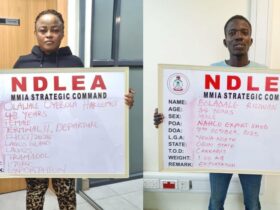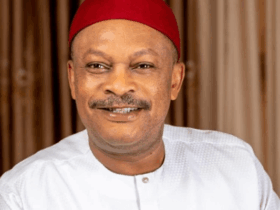Lamentation in the morning of freedom

Music has ceased to play in Nigeria, or so it seemed yesterday. The faces that were once brightened by the joy of independence have become dull.
Nigeria yesterday was as cold as iced fish and as quiet as a graveyard. Singers have hung their musical instruments as disappointment runs in their veins. A day that was supposed to be a joyous moment of freedom has suddenly become a day of lamentation. That was the situation yesterday. Who did this to us? How did we get here?
In many cities across Nigeria yesterday, there were conferences hosted by governments, corporate bodies, religious bodies and individuals.
Those gatherings featured nostalgic forays into what worked in yesteryears and what is not working now. The events featured speeches of regret about how Nigeria has not lived up to being a potentially great nation as envisioned by the colonial masters.
This has been the ritual. year after year. Chances are that by this time next year, such gatherings would reconvene. Those who presented papers this year would just dust up the files, change the year, and they would be good to go.
Endless lamentation, you may say.
Yesterday was supposed to be a celebration day. It was supposed to be colourful with many activities to mark it. It was the 65th anniversary of Nigeria’s independence.
But it wore a sombre look by every standard of assessment when compared to what the day used to be shortly after Independence and in the 80s and 90s.
Read also: Independence Day: Abiru salutes Nigerians’ resilience, steadfastness
It is a significant date in the life of Nigeria as a country. After a hard fight and agitation for an independent sovereign nation, the colonial masters at the time saw the need to exit the power stool. They handed power to indigenous leaders.
At that time, what is now known as the dreams of the Founding Fathers were born. They dreamed of a nation where tribe and tongue may differ, but in “brotherhood we stand”. They dreamed of handing to “our children a banner without stain”. They dreamed of a nation “where no man is oppressed”.
But whether these have been realised as the country marked the 65th anniversary is open to debate.
Every citizen, irrespective of tribe, tongue and religion, bought into the dream, which accounted for the effusive expression of joy and gladness that greeted the day.
The colonial rule ended at midnight on September 30, 1960. Lagos, which was at the time the capital of the country, was electric with all sorts of celebrations.
A great gathering of people from all walks of life and guests from foreign lands poured in. All Nigerians were on the same page.
No bitter politics. No recrimination. Just celebration galore. Everyone waved the green, white, and green flag, and there were cultural displays representing various parts of the country and their rich cultures.
Schoolchildren staged a march past, and they nursed hope for a brighter future. Many years after the effusive joy and great gladness during the anniversary, the conviviality that used to greet the day has vanished. Increasingly, leaders have reduced the day to a mere nationwide broadcast.
While Nigeria marked the day yesterday, citizens were burdened by many challenges, and they did not see reason to celebrate an independence they believe is largely on paper.
While the country celebrated yesterday, the media space was awash with unpalatable news about killings in some parts of the country by bandits and robbers. The families of 15 vigilante operatives and hunters killed by bandits in Kwara State were in a mourning mood. The murder of a female journalist with Arise Television in Abuja, a few days ago, by armed robbers, was still fresh in the minds of citizens as Nigeria clocked 65.
There was lamentation across the country. While some were complaining about hunger and abject poverty, others were saying that they no longer feel safe. The government’s efforts have not been able to meet the needs of the people.
On the security front, Nigeria has moved from a nation where citizens moved freely in the past to one where any movement from one part of the country to another is fraught with enormous danger.
Read also: Nigeria at 65: Independence without freedom, reform without trust
Killers in the name of bandits, kidnappers, organ harvesters, Boko Haram and other criminal gangs lay siege every inch of the way.
It is so much so that Nigerians now engage in days of prayer and fasting before they embark on interstate journeys. In those days, parents would hand over their children to complete strangers travelling with commercial buses or trains to another part of the country, several kilometres away. Those children arrived at their destinations safely and in peace. Such things no longer happen today. Only politicians with a heavy armada of security personnel and bodyguards can easily move around these days. Nigeria has degenerated to a level where communities are signing memoranda of understanding (MoU) with bandits to be allowed to live in peace in their own domain.
Citizens are slaughtered like chickens across the country. The security situation in Katsina, Kaduna, Sokoto, Zamfara, Borno and now Kwara has become worrisome. Non-state actors appear to be dictating the pace of things in the country.
This was never part of the dreams of the founding fathers. The most worrisome of it all is that we hear daily that those saddled with the onerous task of protecting the lives and property of citizens are being compromised. They are being corrupted to sell out, and the country is paying heavily for it. Life is, incrementally, becoming brutish and short in Nigeria.
Nigeria has come to a point where her citizens prefer living abroad to staying back home, with all the hazards they meet on their way while travelling. Today, if aircraft could be stationed at all the international airports in the country to freight people to Europe and America at no charge for them to go sweep the streets of those countries, not many people would be left behind.
That is the criticality of the situation, and that was never the dream of the forebears.
Unlike at independence, when Nigerians spoke with one voice and saw things from the same point of view, today, they are a divided lot. Nigeria has become a babel, and hatred has deepened.
Many Nigerians, except those in government, agree that Nigeria is more divided today than it has ever been in its 65 years of existence.
The acclaimed social cohesion is non-existent, and the evidence is everywhere. What many Nigerians are seeing today is a nation that is being gradually driven to a precipice. People now talk about their ethnic leaning more than their Nigerianness.
People today are apprehensive about living outside their geopolitical zones; these are no signs of a progressive nation.









Leave a Reply